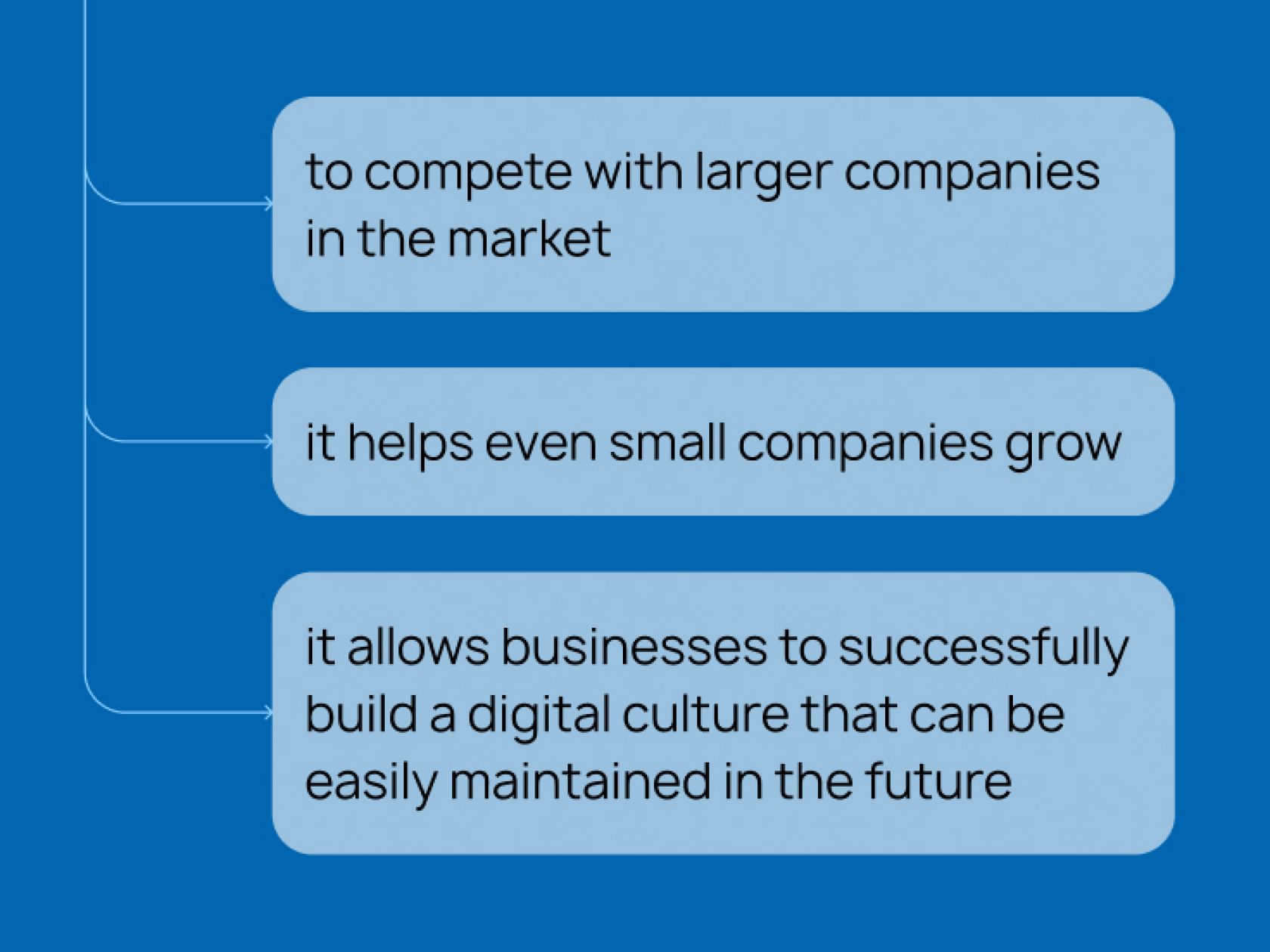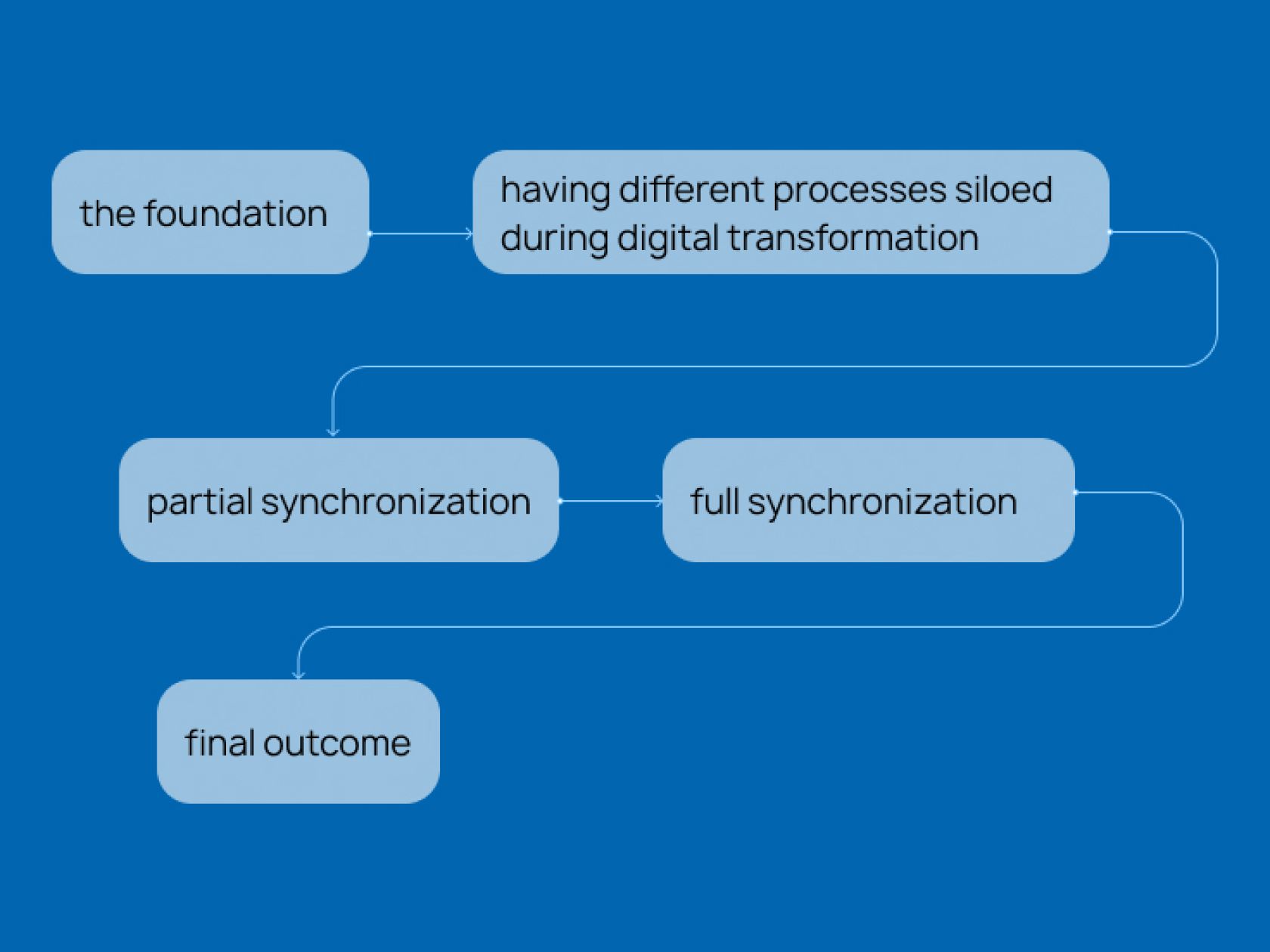Digital transformation is a complex process that is designed to change our lives and the way we work in many ways, leading to a greater connection with technology and new business reality. In modern times, this process is already inevitable, since many professional fields have stepped towards the use of a large number of digital technologies and their influence in order to reach a new professional level. For businesses, digital transformation is extremely important. It allows you to grow not only professionally, but also in many other aspects. Technology is a simple way to handle many work tasks much easier and more efficiently, without the need to increase the time or effort of former employees. With the help of modern technologies, processes are automated and organized much easier.
In order to integrate into the new business reality and be able to successfully interact with companies that are already using digital transformation in their work, business owners should consider this process as part of their professional growth. In order to do this, roadmaps for digital transformation are needed to help you navigate this long and difficult process. How to implement it and what benefits it can bring to a company that has decided to try the digital transformation approach, – we will discuss these aspects in this article. Knowing about this process, as well as about the roadmaps to it, is especially important in today's professional reality since we will not escape the influence of technology anyway. If we deal with them, learn how to properly implement them in our activities, and be able to correctly structure this process, it will be very useful for our professional growth and profit.
How Does Digital Transformation Work?
In a nutshell, the process of digital transformation refers to a method of changing the company’s workflow with the help of advanced usage of modern technology and innovations so professional performance allows the organization to compete with other companies on the market in the changing reality of growing digitalization. Additionally, digital transformation is not just about adopting new technologies; it's also about optimizing existing processes and resources. One area where digital innovation can create significant improvements is asset management. As companies embrace digital transformation, they are also beginning to realize the potential of advanced asset management strategies.
Companies need digital transformation for a variety of purposes. It will not only help you stay in the market. It generally changes the approach to work towards greater compliance with modern realities and allows better interaction with technologies that are relevant on the market. The very definition of digital transformation implies that it is not just the introduction of technology into all the main aspects of the organization's work, it is a more complex tool that, as a result, can help businesses establish a digital culture and in the future, it will only need to be maintained. The process includes five major stages, they are characterized by gradual progress towards the penetration of technologies into the activities of the company and its changed approach to work. In simple terms, the stages can be described as:
- the foundation;
- having different processes siloed during digital transformation;
- partial synchronization;
- full synchronization;
- final outcome.
Such a differentiation helps better understand the complex progress that you need to make during the process of digital transformation and helps you to navigate easier. Also, you need a roadmap so everything goes smoothly and suits your needs.
Since you have many processes, each of which is equally important, understanding them can be quite difficult. Digital transformation is constant progress and movement towards a deeper implementation of technologies in a company, it takes time, so even if at the initial stages you cope with the steps that need to be taken, things can become more difficult in the future. Also, the confusion between transformed and non-transformed processes can create additional problems.

What Are the Main Benefits of Digital Transformation?
Today, digital transformation is already a new reality and not technological innovation. Companies are increasingly engaging in it, thereby creating a popular tendency. In order to correspond to modern professional reality, it is also necessary to be aware of digital transformation and its aspects as it helps to navigate the modern digital world.
A structured approach to digital transformation is vital as the details in this process are equally important. The process is not fast, so the plan should be detailed and include various options. Simplify your work as much as possible by planning so that in practice everything is more understandable. The more comprehensive and incremental your roadmap is, the better the transformation will be. Knowing about the features and stages of the process, as well as its advantages, will help you better understand it and put it into practice. The process of digital transformation has a number of undeniable advantages, which we will discuss in detail below. Some of them are the following:
- digital transformation gives the ability to compete with larger companies in the market;
- it helps even small companies grow;
- it allows businesses to successfully build a digital culture that can be easily maintained in the future.
In addition, many examples of the successful implementation of this method indicate that using it is easier for companies to survive in a business environment. Growth can be a very important priority for companies, especially when considering the financial aspect. If a small or medium-sized company takes a course for development, then along with responsibility, its prospects also increase. In today's market, this process cannot do without technological means. Therefore, for the growth and increase in the profits of small companies, digital transformation can be an important factor.
When it comes to competing with larger organizations and staying afloat in the ever-changing market, research shows that this is a reality for companies that have gone through a digital transformation. You just need to give enough time and attention to the details that constitute this complex process, and technology will help you do that.
One of the most important benefits of IT transformation is that it helps to recognize and meet customer expectations. In addition, with minimal resources, the quality of your services only grows. Understanding the needs of the client leads to the fact you improve the quality of your services. This is an extremely important factor for your performance. Digital transformation is also important because it can help you improve customer experience, which in turn is also an important factor for the final result.
Among other aspects, digital transformation can help companies significantly in terms of efficiency. It allows you to better understand the needs of customers and improve the process of making important business decisions. This affects the financial factor a lot and is beneficial for the company in the long run.
The implementation of digital culture and a completely new mindset in your organization are also undeniable bonuses of digital transformation. There are many aspects of a business that are affected by IT transformation, and the mindset within the team is one of them. It is important to maintain the level of organization that you aspire to, and then your results will be truly impressive. You will also achieve much more efficient work.
What Are the Key Aspects You Need to Consider When Building a Digital Transformation Roadmap?
Before you start creating a roadmap, study the topic. The process of digital transformation for a company is complicated and requires a lot of resources. It will not be quick and will require a real detailed analysis. Therefore, if you decide to take this step and change the way your company works with the help of digital transformation, get ready that the investment will be serious, but it will be worth it. First of all, when faced with difficulties, it is important to remind yourself that they are inevitable because the process itself is not easy. However, if you overcome the initial problems, you can move on to more impressive results. The question is, whether you understand how to move forward in your digital transformation.
The first thing to consider when building a roadmap for a company's digital transformation is that you need to be attentive and consider every detail so that technologies can be implemented in all functional parts of the business. The transformation cannot be built by changing only random aspects of the business and acting chaotically. So it’s worth remembering that you will need a structured plan before you get to the process.
In order to build a detailed roadmap that will meet your needs, before you start, study all five stages of IT transformation. Next, you will need to evaluate the current state of affairs in your company. Next, starting from what you have, proceed to setting goals and visualizing the results. After that, you can go on to an analysis of the problems and difficulties that will inevitably arise and you will be able to meet them fully armed. In the end, determine in what ways you can deal with them, what methods are available to you, and start creating a digital transformation roadmap.
This approach will help you to better identify your strengths, weaknesses and current position, and will also help you deal with them easily in case of problems, because you will know what to do and will be able to prepare.
How Important Is Digital Transformation for Logistics?
Logistics digital transformation is considered very beneficial. For logistics, as for any other business, the impact of technology is pervasive and fundamentally important. Various digital tools allow you to optimize processes and significantly improve business results. The implementation of digital transformation in logistics will mean its fundamental transition to digital technologies and better compliance with market realities. A detailed roadmap will help avoid unnecessary moves and provide an opportunity for greater efficiency in this process. Technologies such as Artificial Intelligence and Big Data are already influencing logistics and underpin many of its technical aspects. In the future, it is expected that they will develop even further. These technologies are fundamental to the process of logistics transformation and affect many aspects of various industries beyond logistics as well.
Conclusion
The need for digital transformation was caused by the variety of changes that the new business reality is taking effect. The COVID-19 pandemic has also had a significant impact on this process. Digital reality is changing rapidly, and the professional fields that it affects are also not standing still. Therefore, now the use and implementation of the latest technologies is already such a basic necessity, as well as the provision of quality services. We live in a time when we are surrounded by a huge number of digital processes – and logistics is no exception. To meet today's standards, sometimes it is worth taking significant measures, and digital transformation is among such strategies.
The coronavirus pandemic has had a profound effect on the entire transportation industry, and logistics in particular. As a result, new needs arose. Companies began to solve their problems by implementing IT transformation. Changes such as the pandemic show how vulnerable the business sector is to the constant changes in the world and how important aid strategies are. By leveraging technology and digitalization, you can hedge against sudden shocks and strengthen your position in the market. The events of 2021 have shown how important this is.
Such undeniable advantages as the ability to compete with larger businesses and a good position in the market, as well as the fact that almost all companies are now subject to digitalization and this has a beneficial effect on business, indicate that this process can be beneficial even for small organizations. In the long term, it enables much greater efficiency, as well as the establishment of much stronger relationships with customers through a better understanding and satisfaction of their needs. Steps taken towards greater inclusion of technology will help you to be represented in today's digital reality much better.



